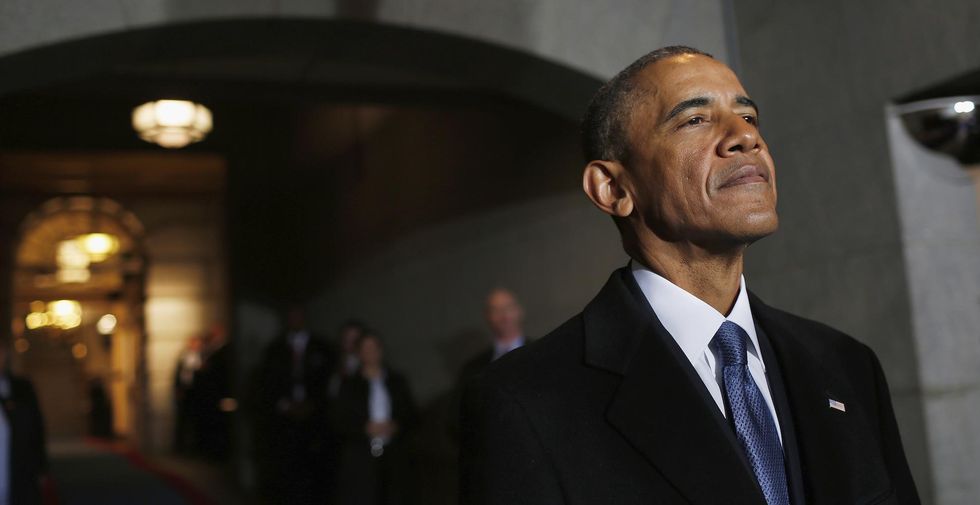
Win McNamee/Getty Images

The honeymoon is over.
Former President Barack Obama has issued his first post-presidential statement over his successor Donald Trump's executive action freezing the refugee resettlement program and temporarily barring entry into the U.S. from seven Muslim-majority countries.
Obama, through a statement penned by spokesman Kevin Lewis, took issue with Trump's assertion that the executive action he took Friday is "similar to what President Obama did in 2011 when he banned visas for refugees from Iraq for six months."
Trump's action institutes a 120-day freeze on the U.S.'s refugee resettlement program and a 90-day halt on entry into the U.S. from seven predominantly Muslim nations — Iran, Iraq, Somalia, Syria, Sudan, Yemen and Libya — with an indefinite ban placed on would-be visa applicants from Syria.
"With regard to comparisons to President Obama's foreign policy decisions, as we've heard before, the president fundamentally disagrees with the notion of discriminating against individuals because of their faith or religion," Lewis wrote.
In 2011, two Iraqis living in Kentucky were arrested and faced federal terrorism charges after it was discovered through an informant that Waad Ramadan Alwan, before being granted asylum in the U.S., had constructed improvised roadside bombs in Iraq. After examining fragments from thousands of bombs, the FBI found Alwan's fingerprints on a wireless phone that had been coded to detonate a bomb in 2005, according to the Washington Post.
The arrests sparked outrage in Congress and led to the Obama administration pledging to re-examine the records of 58,000 Iraqis who had settled in the United States. In addition, the White House subjected Iraqi refugees to more strenuous backgrounds checks.
The Baltimore Sun reported on the slowdown the re-examination caused:
The enhanced screening procedures have caused a logjam in regular visa admissions from Iraq, even for those who risked their lives to aid American troops and who now fear reprisals as the Obama administration winds down the U.S. military presence.
There was, in fact, a major logjam in visa admissions from Iraq. According to State Department records, there were only 6,339 refugee arrivals from Iraq in 2011, down from 18,251 in 2010 and 16, 369 in 2012.
But that doesn't equate to a ban, according to former Obama administration official Jon Finer, who spoke out on the matter Monday.
"While the flow of Iraqi refugees slowed significantly during the Obama administration’s review, refugees continued to be admitted to the United States during that time, and there was not a single month in which no Iraqis arrived here," he wrote in Foreign Policy. "In other words, while there were delays in processing, there was no outright ban."
It is important to note, too, that, at face value, the only place it seems Trump’s action is “discriminating against individuals because of their faith or religion,” as Lewis asserted, is in section 5, paragraph (b).
The order calls for the prioritization of “refugee claims made by individuals on the basis of religious-based persecution, provided that the religion of the individual is a minority religion in the individual's country of nationality.”
In addition, the seven countries banned from entry into the country were actually selected by the Obama White House.
According to the Visa Waiver Program Improvement and Terrorist Travel Prevention Act, which passed through Congress with little pushback, foreigners who had in the past five years visited or held dual citizenship in any of those seven Middle Eastern countries were no longer eligible for the Visa Waiver Program, which allows citizens from 38 countries who are visiting the U.S. for less than 90 days to do so without a visa.
As for the anti-Trump protests breaking out at airports across the country in response to the immigration order, Obama was "heartened by the level of engagement taking place in communities around the country,” Lewis said.
"Citizens exercising their Constitutional rights to assemble, organize, and have their voices heard by their elected officials is exactly what we expect to see when American values are at stake," he continued.
Obama, who said early on that he would not seek to interfere in the Trump administration, said he would only speak out if the country's "core values" were in danger — a vow he made earlier this month when he was talking about Trump's threat to deport illegal immigrants.
The former president, a Democrat, was specifically talking about so-called Dreamers, minors who were brought here illegally as children, whom he said "for all practical purposes are American kids."
"The notion that we would just arbitrarily or because of politics punish those kids, when they didn't do something themselves ... would merit my speaking out," Obama said.
Trump, for his part, signaled last week that his administration is going to "work something out" with Dreamers "that’s going to make people happy and proud." The president didn't offer any additional details on the subject.